Grounded in the latest research and shaped by the experiences of people living with MS, this guide offers practical, accessible information to support lifestyle choices that may reduce relapses and symptoms, slow progression, and improve quality of life.
This guide for health professionals brings together the latest evidence on lifestyle factors in MS, offering practical insights and evidence-based interventions to support MS management, clinical conversations, and shared decision-making to improve health outcomes for people living with MS.
Nearly all Australians living with MS want to make lifestyle changes that could improve their MS symptoms and overall quality of life, but new survey data released today has found that nearly three in four struggle to identify credible, safe and relevant information.
In this special World MS Day episode of The Raw Nerve, MS Australia’s Head of Research Dr Julia Morahan, MS Australia research coordinator Dr Jo Gamble, and Lived Experience Expert panel member and artist Deanna Renee join Raw Nerve host Jeremy Henderson to discuss the new MS Australia publication Living well with MS: Your guide to adapting your lifestyle.

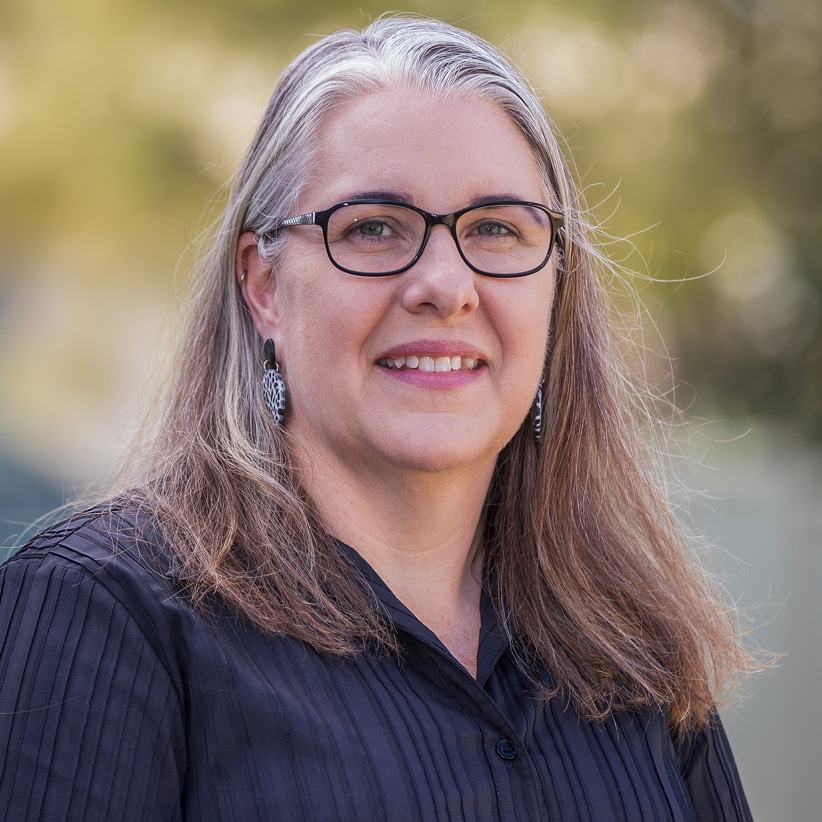
I have never been so active and healthy in my life. All since being diagnosed with a chronic disease! Particularly, over the last 12 months, I have made the effort to steadily increased my physical activity.
This has helped improve my quality of life, in terms of improved mental health, stress management, strength and balance. Regular movement reduces my pain and stiffness and sets me on a positive path for the day.
I enjoy a good mix of walking, yoga and personal training sessions, an average of four days throughout the week. I adjust the level of my physical activity if I have an off day.

Since 2020, art has been my go-to mindfulness practice, helping me slow down, breathe, and stay present. Whether I’m crafting, drawing, or playing around with digital mixed media, the creative process gives me space to focus and let go, especially times when MS makes life feel overwhelming.
For me, some emotions are just too big or complicated for words, but art helps me express them in a way that feels natural and freeing. Making time for creativity has been a game-changer for my mental wellbeing, reminding me that mindfulness isn’t just about meditation, it’s about finding joy in the moment, however that looks for you.
Living with MS alongside other chronic conditions like endometriosis and depression means learning how to support my body and mind in ways that feel sustainable. For endo, I’ve found that leaning into an anti-inflammatory diet helps me manage the inflammation and some of my pain symptoms. Think of meals that feel both nourishing and comforting. It’s never about being perfect – just intentional in my food choices.
When it comes to depression, I’ve built up a little toolkit from my studies, therapy, and podcasts that helps keep me grounded. Two of the biggest game-changers for me have been opposite action (aka doing the thing even when I really, really don’t want to) and self-compassion, which basically means trying not to bully myself for having a tough time. Some days, that means getting outside for a walk, other days, it means letting myself rest without guilt. It has been really hard learning to treat myself with the same kindness I’d offer a friend.
Managing multiple chronic conditions isn’t easy, but being proactive through food, therapy tools, and a dash of trial and error helps me feel more in tune with my body and what I need. Some days are still messy, but it’s all about finding what works and giving yourself permission to adjust as you go.
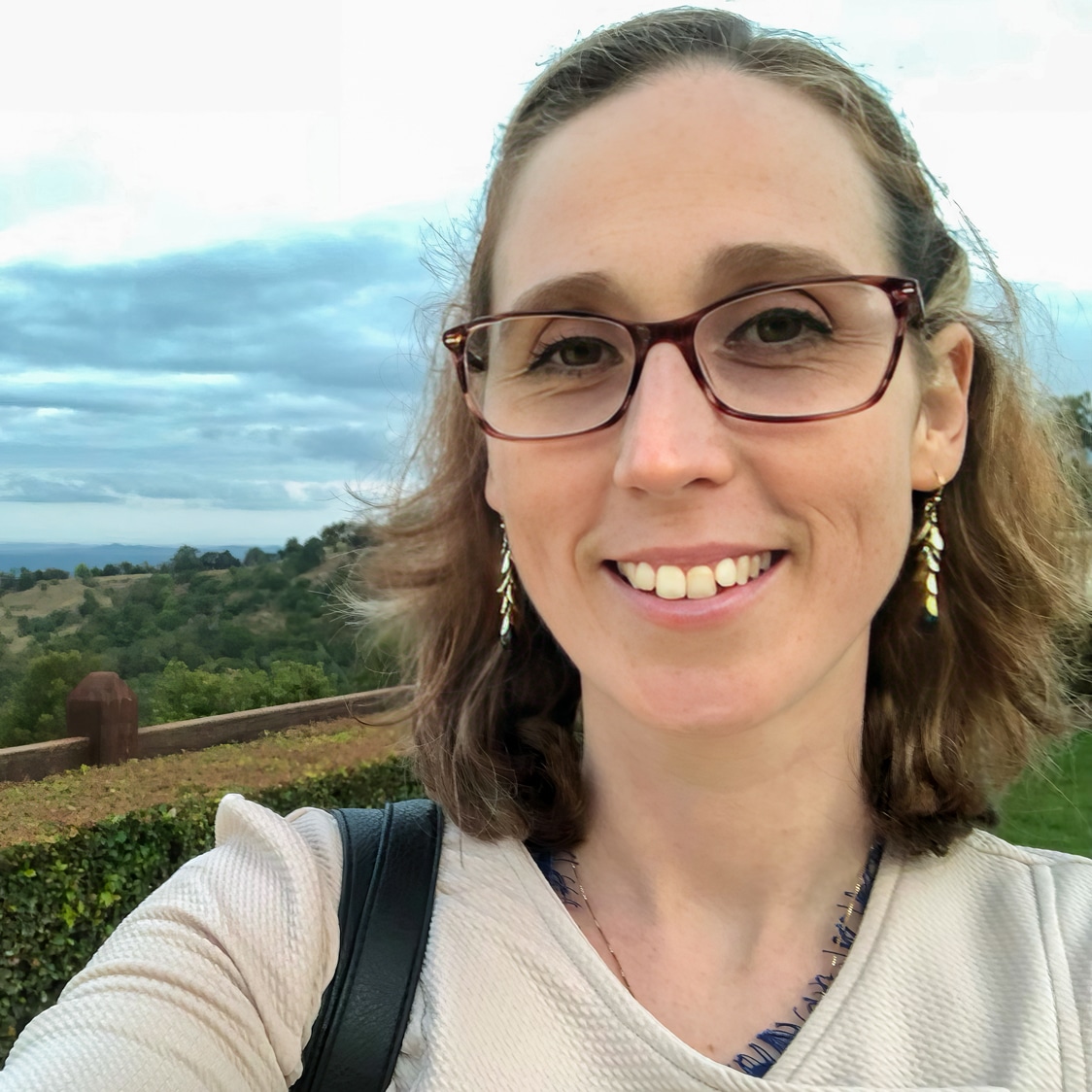
Prior to my MS diagnosis, exercise was never something that I particularly engaged with or enjoyed. I did enough walking and cycling to keep me healthy and played the occasional game of squash, but I’ve always been happier in front of my computer keyboard or with my nose in a book. When I became unwell, I started to research the things I needed to do to keep me healthy as I recovered from my initial relapses, and along with the purely medical aspects came a realisation that physical strength and flexibility were things I was going to have to work hard at to maintain and grow.
I began engaging in regular exercise physiology sessions that were targeted at areas of physical weakness I didn’t even know I had until I did an assessment, and was very encouraged to see my capabilities grow with time.
Because there are no MS-specific exercise physiologists in my region (my practitioner is over 1,300km away and we meet via telehealth), I’ve joined my local gym and do my prescribed exercises there with the support of their Personal Trainer.
One of my close friends attends the same gym, and the social fulfillment I get, as well as building my physical strength, has been incredibly rewarding. I’ve also found over time that exercise is very beneficial in helping me to manage my fatigue levels. By allowing flexibility in my prescribed programs as well as continuing other exercises like outdoor walks and short games of squash I’ve found a diverse range of ways that I can exercise and feel benefit both when I’m feeling well and on days when my energy is low.
From a different perspective, I also recognised after my diagnosis the need to build mental resilience and expand my toolkit of stress management techniques, so I started practising yoga. It has been a complete revelation for me – I love the poses for the physical strength they build, the mental resilience and discipline they promote, and the meditation for the inner calm it affords when things seem out of control. I have found the combination of benefits I get from yoga incredibly helpful when navigating day-to-day life with MS, and I couldn’t recommend it more highly to others.
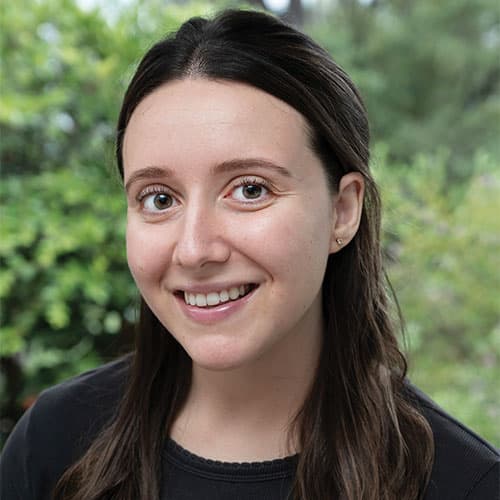
When I was first diagnosed with MS, I felt like my body had failed me despite already living a healthy lifestyle. I went into a period of denial and stopped taking care of myself – neglecting my diet and regular exercise. It took time to forgive my body and return to those habits. Now, I make a conscious effort to eat well and stay active, focusing on feeling strong and supporting my mental wellbeing.
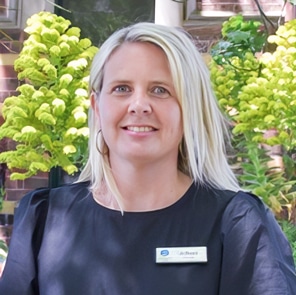
Good gut health is compromised and complex when it comes to impacts from my PPMS. Having a ‘team’ of specialised therapists, all aware and working together on the same page, significantly benefits my management instead of only concentrating on a single symptom in isolation.
Natural Vitamin D is beyond important in helping manage my PPMS, I love it! The only issue is not loving the sun too much causing further unwanted fatigue. Getting the balance right is key.
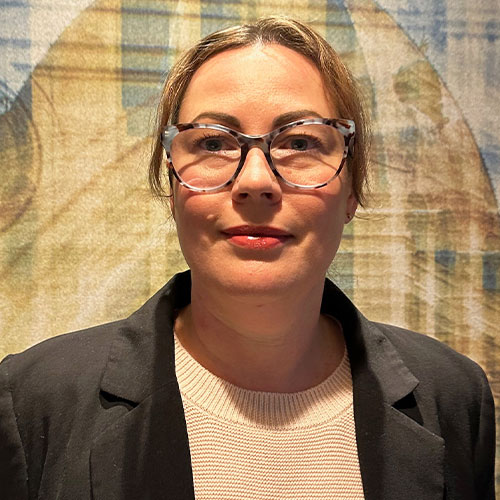
Living with MS has shown me just how much lifestyle factors influence my wellbeing. Prioritising nutrition and gut health have helped me manage symptoms and feel more balanced. Getting outside in the morning sun has been just as important—not only for vitamin D but also for my mental wellbeing.
Optimising sleep and addressing other health conditions have played a crucial role in how I navigate MS. These changes have given me a greater sense of control over my health and wellbeing.

Regular physical activity has been a real game-changer for me in terms of enhancing my wellbeing. I like to mix things up based on my energy and mood, so my week includes a variety of activities like low-impact aerobic exercise, swimming, strength training, and gentle stretching.
Over time, I’ve started to feel stronger, fitter, and more flexible. Plus, it helps manage symptoms like muscle stiffness and fatigue, giving me more energy overall.
Where possible, I try to double down so that my exercise also serves to reduce stress. For instance, I make an effort to go bush-walking at least once a week for a digital detox. And swimming, well, that’s my version of pseudo-meditation. It’s like my brain gets to tread water while the rest of my body does freestyle up and down the pool.
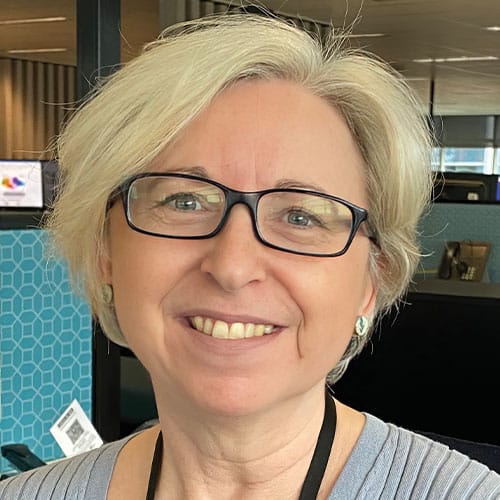
Diagnosed with relapsing remitting MS in 2004, I was 37, in the process of building my career as an accountant, and in the prime of my life. It was an exhausting, overwhelming and scary time, but things seemed to “settle” about 18 months later.
I’m very lucky to have a very supportive and understanding husband who could see I was struggling to work five days. Weekends were used to recover at home so I could then work the following week. My husband said I needed to look at life now as a marathon, I needed to slow down and he suggested I change to a four-day working week.
I had told my workplace about my diagnosis, and thankfully, my employer was fine with me not working on Wednesdays to rest or go to medical appointments. It took a while for me to understand my reduced energy levels, which included reducing social events, and stopping to rest when I needed to and recognising I couldn’t do everything I used to do.
Over the years, I have done and still do meditation, physiotherapy, Bobath therapy, acupuncture, therapeutic massage, and reflexology. I believe it’s important to find what works for you, and I believe “slowing down” has been the main thing that has helped me have a good work-life balance, and now over twenty years after diagnosis, I am still working four days a week!
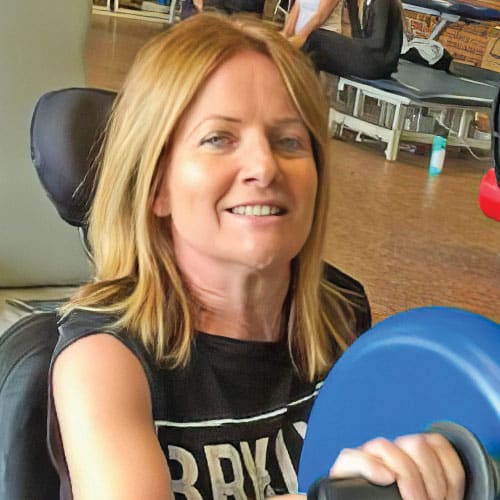
I was lucky enough to be involved with an MS research exercise study for advanced MS with Sydney University, run by Dr Ché Fornusek. The study involved using functional electronic stimulation on the muscles of the glutes, quads, hamstrings and calves.
Ché’s studies evolved, and in the second trial he introduced arm cranking, which he referred to as hybrid functional electronic stimulation, which benefited both cardio and muscle stimulation.
I participated in a couple of trials and was fortunate to be able to continue the program afterwards, thanks to Ché and his PhD student Suzie Mate.
Unfortunately, COVID stopped us from participating, and I developed a shoulder injury, which prevented me from continuing with the trials. My function declined considerably during the COVID years. I can’t be certain, however, I feel things would be different if I had not had to stop suddenly. I have now lost most of my arm and hand function and would love to be able to turn back the clock.
I purchased my own sets of electronic stimulation, and I have a very dedicated trainer who has worked with me for 11 years and we spend about four hours each week using electronic stimulation on the muscles of the back, glutes, quads, hamstrings, calves and triceps.
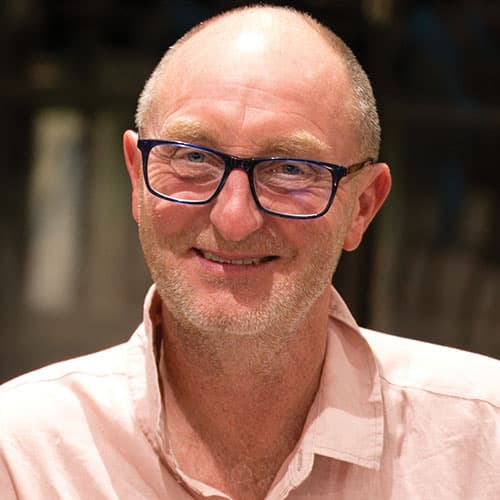
MS has been part of our life as a couple for almost 35 years. Jane and I had only just married and bought our first home when I was diagnosed. Back then, I did feel a bit ripped off. But now, I feel this is my life’s journey. It is what it is, and I’m determined to contribute the best I can to our family.
Living with a degenerative neurological condition isn’t easy. I experience pain every day, double vision, continence issues with both bowel and bladder, thermal regulation challenges, memory lapses, and sensory loss. Some days are better than others, especially if I can keep cool. I’ve developed a strong relationship with our air conditioning unit!
To manage my MS, I’ve built a routine. Each morning, I warm up my body before starting work. It helps with fatigue. Meditation also plays a big role. It doesn’t take the pain away, but it helps me manage it, psychologically putting it in a place where I can say, “I’ll get through this.”
Continence is one of the toughest parts. I often say I’m a “public amenity connoisseur.” I know every public bathroom from the northwest coast of Tassie to Hobart. If my brain says something’s about to happen, I’ve got about a minute. Accidents still happen, they’re embarrassing, but it’s my normal. I just get over it and move on.
One of the most important things I’ve done is join a peer support group. Some of the blokes suggested we should get together for a coffee, so now we meet every month for lunch. We talk about everything! It’s a space to recharge, share stories, and have a good grizzle if needed. That regular social connection has become such a big part of improving our wellbeing. It reminds us we’re not alone and gives us something positive to look forward to.
MS shaped our journey, but it hasn’t stopped us. We just adapt. And I couldn’t be prouder or more grateful for the love and acceptance from Jane and the kids. We’re in this together.